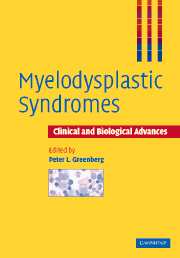Book contents
- Frontmatter
- Contents
- List of contributors
- Preface
- 1 Clinical and prognostic characterization of myelodysplastic syndromes
- 2 Morphologic classifications of myelodysplastic syndromes: French–American–British (FAB) and World Health Organization (WHO)
- 3 Pathogenetic mechanisms underlying myelodysplastic syndromes
- 4 Cytogenetic abnormalities in myelodysplastic syndromes
- 5 Molecular mechanisms and gene expression patterns in myelodysplastic syndromes
- 6 Immunologic mechanisms and treatment of myelodysplastic syndromes
- 7 Biologically targeted therapies for myelodysplastic syndromes
- 8 Supportive care in myelodysplastic syndromes: hemopoietic cytokine and iron chelation therapy
- 9 Hematopoietic cell transplantation for myelodysplastic syndromes
- 10 Health-related quality of life for those with myelodysplastic syndrome: conceptualization, measurement, and implications for research and practice
- Index
- Plate section
- References
8 - Supportive care in myelodysplastic syndromes: hemopoietic cytokine and iron chelation therapy
Published online by Cambridge University Press: 22 August 2009
- Frontmatter
- Contents
- List of contributors
- Preface
- 1 Clinical and prognostic characterization of myelodysplastic syndromes
- 2 Morphologic classifications of myelodysplastic syndromes: French–American–British (FAB) and World Health Organization (WHO)
- 3 Pathogenetic mechanisms underlying myelodysplastic syndromes
- 4 Cytogenetic abnormalities in myelodysplastic syndromes
- 5 Molecular mechanisms and gene expression patterns in myelodysplastic syndromes
- 6 Immunologic mechanisms and treatment of myelodysplastic syndromes
- 7 Biologically targeted therapies for myelodysplastic syndromes
- 8 Supportive care in myelodysplastic syndromes: hemopoietic cytokine and iron chelation therapy
- 9 Hematopoietic cell transplantation for myelodysplastic syndromes
- 10 Health-related quality of life for those with myelodysplastic syndrome: conceptualization, measurement, and implications for research and practice
- Index
- Plate section
- References
Summary
Myelodysplastic syndromes (MDS) comprise a heterogeneous spectrum of clonal myeloid hemopathies characterized by bone marrow failure, morphologic dysplasia, and a variable tendency to evolve into acute myeloid leukemia (AML). In low-risk MDS, excessive intramedullary apoptosis of hematopoietic progenitors and ineffective hematopoiesis contribute to the paradoxical finding of hypercellular marrows in the setting of chronic refractory cytopenias. Evolution to AML occurs in approximately 30% of MDS cases, and is frequently associated with reversion of marrow myeloid precursors to a leukemic phenotype. The in vitro and in vivo study of the proliferative and differentiation abnormalities involved in MDS hematopoiesis has been facilitated by the development of recombinant hemopoietic growth factors (HGFs). Refractory cytopenias are major causes of morbidity in MDS. Thus, supportive care to manage these consequences of the marrow failure in MDS is the mainstay of treatment for these individuals.
Symptomatic anemia is a critical clinical problem in MDS. Cytokine therapy with recombinant erythropoietin (rEPO) has resulted in erythroid responses in a proportion of individuals with MDS, which can be substantially increased in selected patients with addition of recombinant granulocyte colony-stimulating factor (rG-CSF). Identification of the clinical and histopathologic features which predict response to these HGFs permits tailoring of these treatments to appropriate subsets of MDS patients. Due to the combination of ineffective erythropoiesis and the relatively large amount of red blood cell (RBC) transfusions MDS patients receive to treat their hypoproductive anemia, a substantial proportion of these individuals have iron overload.
Information
- Type
- Chapter
- Information
- Myelodysplastic SyndromesClinical and Biological Advances, pp. 209 - 242Publisher: Cambridge University PressPrint publication year: 2005
References
Accessibility standard: Unknown
- 1
- Cited by
